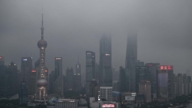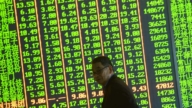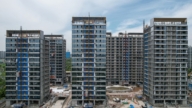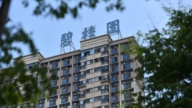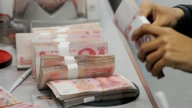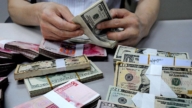【新唐人2014年09月22日讯】河北邯郸房地产龙头企业集资违约、老板跑路后,引发数十家房地产企业集体违约,导致上百亿民间集资和借贷违约集中爆发,上千人围堵政府。在专家看来,如今邯郸地产界的恶果,是地方当局亲手种下的,因为它们把土地当作摇钱树,并且这一现像在中国普遍存在。
中共喉舌《人民网》日前的报导说,包括邯郸房地产龙头企业金世纪房地产开发有限公司在内的,数十家企业的民间集资和借贷违约已经集中爆发。粗略估算,这些企业的借贷和集资规模已经达到百亿级,波及建材、建筑、农牧、药材等各行业。
当年这些企业以20% 至30%的年利率,吸引民间资金,如今老板集体跑路,邯郸市的部分主干道,不时会被大批举牌和拉横幅的人群封堵,而地方当局却拒绝透露集资规模。
1999年,邯郸市政府从“厦门九八国际贸易洽谈会”,把金世纪地产公司招商过来。金世纪在邯郸设有金源酒店、联泰建设、新能电力和超凡物业四家子公司,还控股6家法人公司。金世纪被认为在邯郸政界人脉关系极广、实力雄厚。
不过,在多年以前吸引民间资金,就已经成为金世纪解决融资的重要渠道。今年7月因为支付不起投资人的利息,金世纪老板已经逃离邯郸。这在当地引起极大震动,也引爆邯郸民间集资借贷企业大规模违约的危机。
《新唐人》记者多次打电话到邯郸楼盘网服务热线,在这“金九银十”的销售旺季,服务热线却无人接听。
大陆《华夏时报》报导说,邯郸房企集体违约引发崩盘危机,很多人不再敢买房子。
据了解,邯郸市集资借贷波及面太广,很多公务员也参与其中,他们的钱也要不回来。邯郸市政府目前面临巨大的维稳危机。
海外网站透露,有近千名受害业主在9月20号,到邯郸市政府抗议开发商集体卷钱跑路,大批警察筑成四道人墙与民众对峙。
有自称来自邯郸的民众发帖说,邯郸很多信用社老板被政府抓走了,然后通报说携款私逃,老百姓的钱打了水漂。他质问,中间是谁在捣鬼?
大陆经济评论家牛刀:“现在已经普遍出现了,哪个地方都有,钱到哪去了?钱到官员口袋里去了,商人为什么跑路,他就怕暴露了你共产党的官,最后搞得他自己没命了,他才跑路,他现在找不到你商人,他就找政府嘛,它现在完全是胡来,我原来也跟你说了,我说共产党没有多长的时间了,它这么干下去,它是自掘坟墓。”
此前,陕西榆林市8月底有300多名业主,在找不到开发商的情况下围堵当地政府。
9月16号,云南昆明民众手持横幅,将政府办公楼大门团团围住,要求政府向开放商讨回拖欠的拆迁过渡安置费,和延迟交房违约金等款项。
北京大学光华管理学院博士生导师王建国:“房价高主要是政府抬起来的。地价很贵,政府卖地,还有就是税收特别高。有人算过账,房价70%都被政府拿走了,等于把老百姓的财富变成了政府的收入。”
大陆经济评论家牛刀告诉《新唐人》,他访问过重庆、西安等多个城市,遍地都是空房。
牛刀:“不仅仅是房地产的问题,很大的问题出在金融方面,现在放钱出来没有用,全是房子。它搞金融全是房子去抵押贷款,它现在的坏账已经多得不得了,银行一垮就全垮,美元加息以后中国的金融漏洞全要暴露的。”
据《华尔街日报》报导,9月份中共央行暗中向银行体系注资5000亿人民币。
牛刀指出,中共一印钞票,有钱人就会赶快抛售房子兑现,并带着钱逃往国外。
采访编辑/刘惠 后制/萧宇
1,000 Victims Protest Handan’s Property Market Collapse
Handan’s real estate market is suffering from a collective
breach of contract and incidents of bosses fleeing.
With dozens of real estate enterprises and tens-of-billions of
private capital involved, thousands of victims grouped
at the city hall to raise their grievances.
Experts say local authorities are to blame for using land
to make money, which is a widespread phenomenon in China.
CCP mouthpiece, People’s Daily, reported a collective breach
of contract over private funds and lending, with dozens of
companies involved, including Handan’s JSJ Real Estate.
Tens-of-billions of money was misplaced, involving
supplies, construction, farming, and medicine, etc.
The companies involved were attracting private capital
with annual interest rates of 20-30%.
After company bosses fled, crowds entered the main streets
holding placards and banners, demanding the whereabouts
of their funds, but the local government refused to disclose
the amount of collective funds involved.
In 1999, the Handan authorities had invited JSJ Real Estate
to the 1989 China Expo in Xiamen.
JSJ owned four subsidiaries in Handan, including real estate,
a hotel, a power company and a property management firm.
It held six corporations and was considered a politically solid
and well linked company, known for financing private capital.
In July, the boss of JSJ left Handan after not paying investors’
interests, causing panic among borrowers of private funds.
Our NTD reporter tried to phone the Handan LouPan.com
hotline for real estate, but got no reply.
China Times says Handan’s collective default has triggered
a real estate collapse; people no longer dare to buy property.
The situation has affected many in Handan City, including
civil servants; it has created instability for the government.
One overseas website says nearly 1,000 victims protested
to the local government on Sept. 20, confronting police
who had formed four rows of human walls.
Locals said online that many credit union owners who’d been
allegedly arrested, had actually escaped with public funds.
Economic commentator Niu Dao: “It’s going on everywhere;
where’s the money?—It’s been pocketed by the officials.”
“The businessmen ran away, because they feared their lives
would be at risk once the officials were exposed.”
“People have to hold the government accountable,
since the bosses are gone—it’s not right for the authorities
to mobilize the police and mess up the whole situation.”
“The CCP will not last long, because what they’re doing
is actually self-defeating."
Yulin City in Shaanxi faced a similar state with developers
going missing—300 victims met at the city hall in August.
On Sept. 16, Kunming citizens surrounded the local city hall,
demanding that the government request the developers to pay
a relocation fee and for the damage caused by the liquidation.
Prof. Wang Jianguo; Guanghua School of Management,
Beijing University: “The high property prices are mainly
caused by the government, who sell land at high prices
and demand high taxes.”
“70% of property values are said to go to the government,
turning people’s wealth into government revenue.”
Niu Dao says he’s visited cities such as Chongqing and Xi’an
and found vacant buildings everywhere.
Niu Dao: “The problem is not just in real estate, but mainly
in the financial sector, so putting in more money is no use;
vacant buildings are all over the place.”
“Financing has relied on mortgages, but bad debts are high;
once the banks collapse, everything will collapse.”
“When interest on the US dollar will increase,
China’s financial vulnerabilities will all be exposed."
China’s central bank is injecting $81-billion (500 billion yuan)
into five major state-owned banks, reports Wall Street Journal.
Niu Dao says once the CCP prints the money,
the rich will quickly sell their houses and flee abroad.
Interview & Edit/LiuHui Post-Production/XiaoYu


